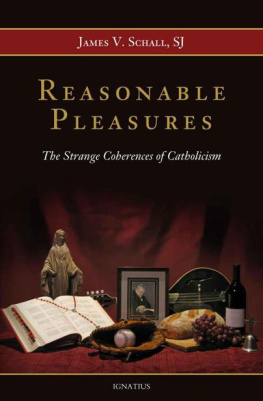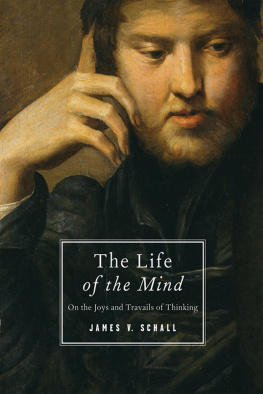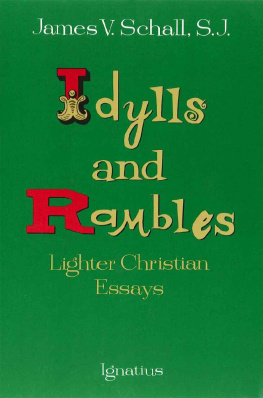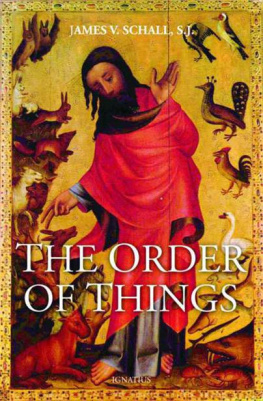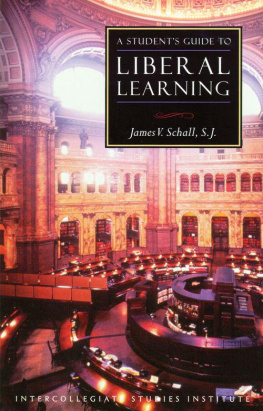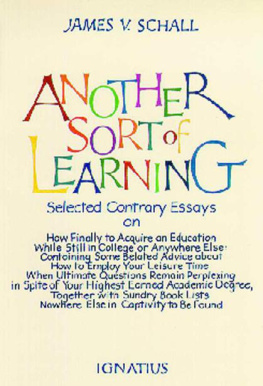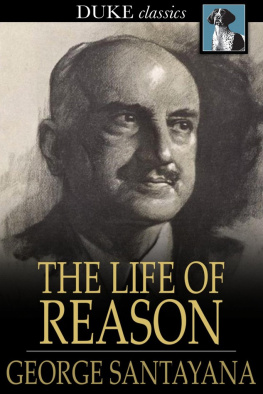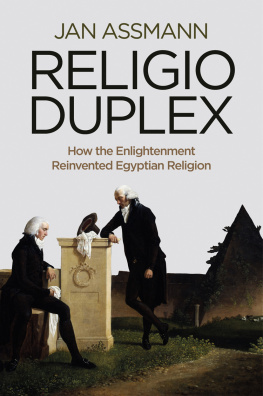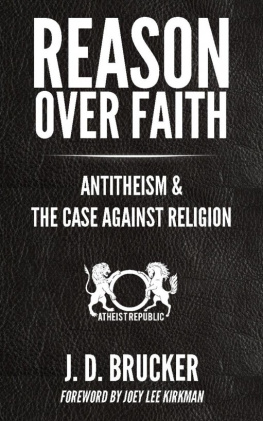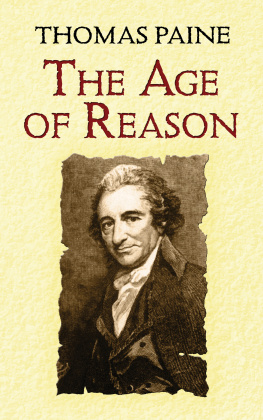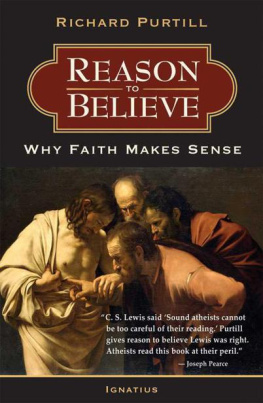REASONABLE
PLEASURES
Father James V. Schall, SJ
REASONABLE
PLEASURES
The Strange Coherences of Catholicism
IGNATIUS PRESS SAN FRANCISCO
Cover photograph and design
by John Herreid
2013 by Ignatius Press, San Francisco
All rights reserved
ISBN 978-1-58617-787-4
Library of Congress Control Number 2013930747
Printed in the United States of America
For if the gods pay some attention to human beings, as they seem to, it would be reasonable for them to take pleasure in what is best and most akin to them, namely understanding; and reasonable for them to benefit in return those who most of all like and honor understanding, on the assumption that these people attend to what is beloved by the gods, and act correctly and finely
Aristotle, Ethics
If I am asked, as a purely intellectual question, why I believe in Christianity, I can only answer, For the same reason that an intelligent agnostic disbelieves in Christianity. I believe in it quite rationally upon the evidence. But the evidence in my case, as in that of the intelligent agnostic, is not really in this or that alleged demonstration; it is in an enormous accumulation of small but unanimous facts. The secularist is not to be blamed because his objections to Christianity are miscellaneous and even scrappy; it is precisely such scrappy evidence that does convince the mind. I mean that a man may well be less convinced of a philosophy from four books, than from one book, one battle, one landscape, and one old friend.
G. K. Chesterton, Orthodoxy
Thus in the modern world, the celibacy of the medieval learned class has been replaced by a celibacy of the intellect which is divorced from the concrete contemplation of the complete facts.
Alfred North Whitehead, Science in the Modern World
Though the Incarnation of Christ is displeasing to the proud, yet there are also many other things in it which will prove profitable for us to examine and to study One of them is that it has been shown to man what place he would occupy in the things that God has established, seeing that human nature could be so united with God as to become one person from two substances; and, therefore, He is now made up of three: God, the soul, and the flesh.
Augustine, On the Trinity
It were to be wished that they who devote their lives to study would at once believe nothing too great for their attainment, and consider nothing as too little of their regard; that they would extend their notice alike to science and to life, and unite some knowledge of the present world to their acquaintance with past ages and remote events. Nothing has so much exposed men of learning to contempt and ridicule as their ignorance of things which are known to all but themselves.
Samuel Johnson, The Rambler
The perfection of the whole of corporeal nature depends in a certain sense on the perfection of man.
Thomas Aquinas, Compendium of Theology
CONTENTS
ACKNOWLEDGMENTS
Chapter 1, Dogma: What Is It?, was originally published in the Homiletic and Pastoral Review , May 2006. The author wishes to acknowledge the publisher for permission to reprint it here.
INTRODUCTION
ON WHAT PROVES PROFITABLE
TO EXAMINE
However, we should examine the origin not only from the conclusion and premise [of a deductive argument], but also from what is said about it; for all the facts harmonize with a true account, whereas the truth soon clashes with a false one.Aristotle, Ethics
I
The beginning of this book contains six brief citations. Each is worth considerable refection. To be able to quote, to state again what was first said by someone not of our time and place, to ponder it, and to reflect on itthese are marvelous human capacities. We can know more than we know because someone else already knows and has recorded what he knows. And we can understand what is handed down to us. Each above passage, I think, contributes something essential to what this short book is about.
The title of this book, Reasonable Pleasures , comes, in spirit at least, from Aristotle, though not without a hint of pleasures and reasons from more specific sources than he knew. Aristotle, no doubt, did most to teach us that knowing itself is a unique pleasure, unlike any others. If we do not experience it, he thought, we likely shall seek other pleasures, usually less noble, to substitute for it. But mainly he guided us to the pleasures of thinking, which includes thinking what is true, the thinking about all that is .
Aristotle taught that every activity that is normal to us, including thinking, has its own proper pleasure. This pleasure was not accidental but was designed to enhance, make right, that action in which the pleasure existed. Pleasure was never itself the end of any action but its bloom or perfection. If we had the action wrong, the pleasure would still exist, but, with the act itself, it would be deflected away from its proper object.
A human being is free to make such distortions, to misuse pleasure, at every step of his life. This possibility is why, Aristotle thought, both actions and pleasures should be guided by reason oriented to what is . The reasonable pleasure of this book, as I see it, is the delight we take in knowing the truth of things, especially the truth about ourselves and our place in the existence of things.
There are things and we know them is how the French philosopher tienne Gilson once put the first intellectual affirmation that we must implicitly make before we can state anything else. If we doubt either of these, either that there are things or that we know them, we cannot get out of ourselves. Nothing is clearer than these statements and what they stand for. They are first principles, evident. Nothing can be and not be at the same time. A thing cannot be true and false at the same time and in the same manner. We must distinguish. This distinguishing is why we have minds.
Nothing can prove such immediate principles because nothing is clearer. To deny them is to affirm them. Their denial, at one point or another, leads to the construction of alternate worlds from the one that is . Whatever first principles we select, we seek to explain everything else in their light. Most thought and most living include conflicts about reality and how we know it. Much is at stake, including what we are about in this world. We also wonder whether, in our doings and thinking, we also transcend the world we know.
Many people disdain citing Aristotle because, they say, he is unscriptural, or out of date, or illogical. The fact is that he is ever pertinent. He helps make intelligible what is found in Scripture. Indeed, both sources, reason and Scripture, often say the same thing. He possessed the most logical mind we have ever seen. To cite Aristotle is always a pleasure. He was a man of truth. The important truths that he did not know, those dealing with revelation or later science, almost always, as Aquinas understood him, found some initial basis in his thought. Aristotle was like his teacher, Plato, in that when he was wrong, he was always very close to what was right.
The subtitle of this book, The Strange Coherences of Catholicism , does not come from anybody in particular, but its overtones are Chestertonian. Chesterton was the great mind who delighted in spelling out all the erroneous, vicious, confused, and silly views about Christianity and Catholicism that he came across in his time in the daily press or culture. Not surprisingly, such odd views, when sorted out, reflected the things that were always wrong whenever or wherever they appeared. He enjoyed this endeavor because he could see both why the view was proposed and why it was not complete or valid. Humor was also found in the effort. Though laughter may not be the final definition of happiness, surely it includes it. We laugh when we see the point. That too is what this book is about.
Next page
